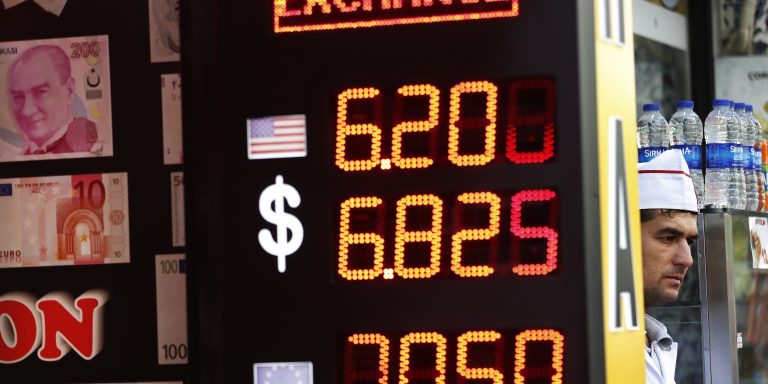INTELBRIEF
August 15, 2018
IntelBrief: Unprecedented Tensions Between Two NATO members

- On August 13, the Turkish lira hit a new low against the U.S. dollar as the two NATO members’ relationship grows increasingly antagonistic.
- After President Trump’s tweet mocking the lira’s decline, President Erdogan said it was ‘economic war.’
- Turkey’s currency has lost 34% of its value since January 2018, creating economic problems in Turkey that are having global reverberations.
- It is unclear how this current crisis will be resolved, as it is part of a larger trend of Turkey’s deteriorating relations with the West.
.
The Turkish lira briefly halted its free fall after hitting a new low against the U.S. dollar on August 13, 2018. The decline was accelerated by the unprecedented tensions between Ankara and Washington, but the causes of the decline run much deeper, stemming in part from Erdogan’s authoritarian rule and his attempts to use Turkey’s economy as a lever of influence. The collapse of the lira, which lost over 34% of its value since January 2018, with a 20% loss in the last week alone, is now rattling other currencies, including the Indian rupee which also hit an all-time low against the dollar on August 13.
The economic crisis comes as Turkey is deepening its involvement in Syria. It has significant interest in the conflict, particularly in Idlib. President Erdogan said on August 13 that Turkey was accelerating the creation of ‘safe zones’ in Idlib, where an estimated 250,000 people had already returned since the Turkish-led rebel alliance had taken over. The move to establish even more zones outside the control of the surging Assad regime is in direct conflict with Assad’s stated goal to reclaim ‘every inch’ of Syria back from the rebels. Idlib is the last sizable rebel stronghold, and neighboring Turkey is unlikely to step aside without considerable concessions to its own interests.
Complicating matters is the plummeting relationship between Washington and Ankara. President Trump once called Erdogan a ‘friend,’ saying that ‘he’s running a very difficult part of the world. He’s involved very, very strongly and, frankly, he’s getting very high marks.’ Yet on August 10, President Trump tweeted ‘I have just authorized a doubling of Tariffs on Steel and Aluminum with respect to Turkey as their currency, the Turkish Lira, slides rapidly downward against our very strong Dollar! Aluminum will now be 20% and Steel 50%. Our relations with Turkey are not good at this time!’
As relations between the U.S and Turkey continue to spiral, Ankara is moving ever closer to Russia. Moscow sees opportunity and common cause in Erdogan’s metamorphosis into an anti-West autocrat. On August 14, Erdogan met with Russia's Foreign Minister Sergei Lavrov in Ankara to discuss, among other things, the ongoing dispute with the U.S. Lavrov said the U.S. tariffs were an example of the U.S. seeking unfair trade advantages, a view that fits well with Erdogan’s well-honed tactic of blaming all troubles on shadowy foreign powers, the U.S. chief among them. The strengthening relations between the two autocrats, Putin and Erdogan, is an alignment of self-interests; not the ‘friendship’ lens through which President Trump tends to view international relations. A Russia-Turkey realignment represents a real challenge to the U.S. and the West, since Turkey remains a NATO member even as it accuses Washington of ‘economic war.’ A splintering of NATO and of Western unity and cooperation is a primary foreign policy goal of Russia—one that it is rapidly achieving.
.
For tailored research and analysis, please contact: info@thesoufancenter.org